Benner's Theory: Novice to Expert Application in Nursing Practice
VerifiedAdded on 2023/06/04
|11
|680
|269
Essay
AI Summary
This essay provides a comprehensive discussion of Patricia Benner's Novice to Expert theory and its application in nursing practice. It outlines the five stages of skill acquisition, from novice to expert, describing the characteristics of nurses at each level. The essay also identifies the assumptions underlying the theory, such as the self-interpreting nature of individuals and the importance of experience in shaping their understanding. Furthermore, it explores the seven roles that nurses perform, as defined by the theory, and the advantages of using the theory to guide nursing education and professional development. The essay references several journal articles that utilize Benner's theory in nursing practice, providing a well-rounded overview of the theory and its practical implications.
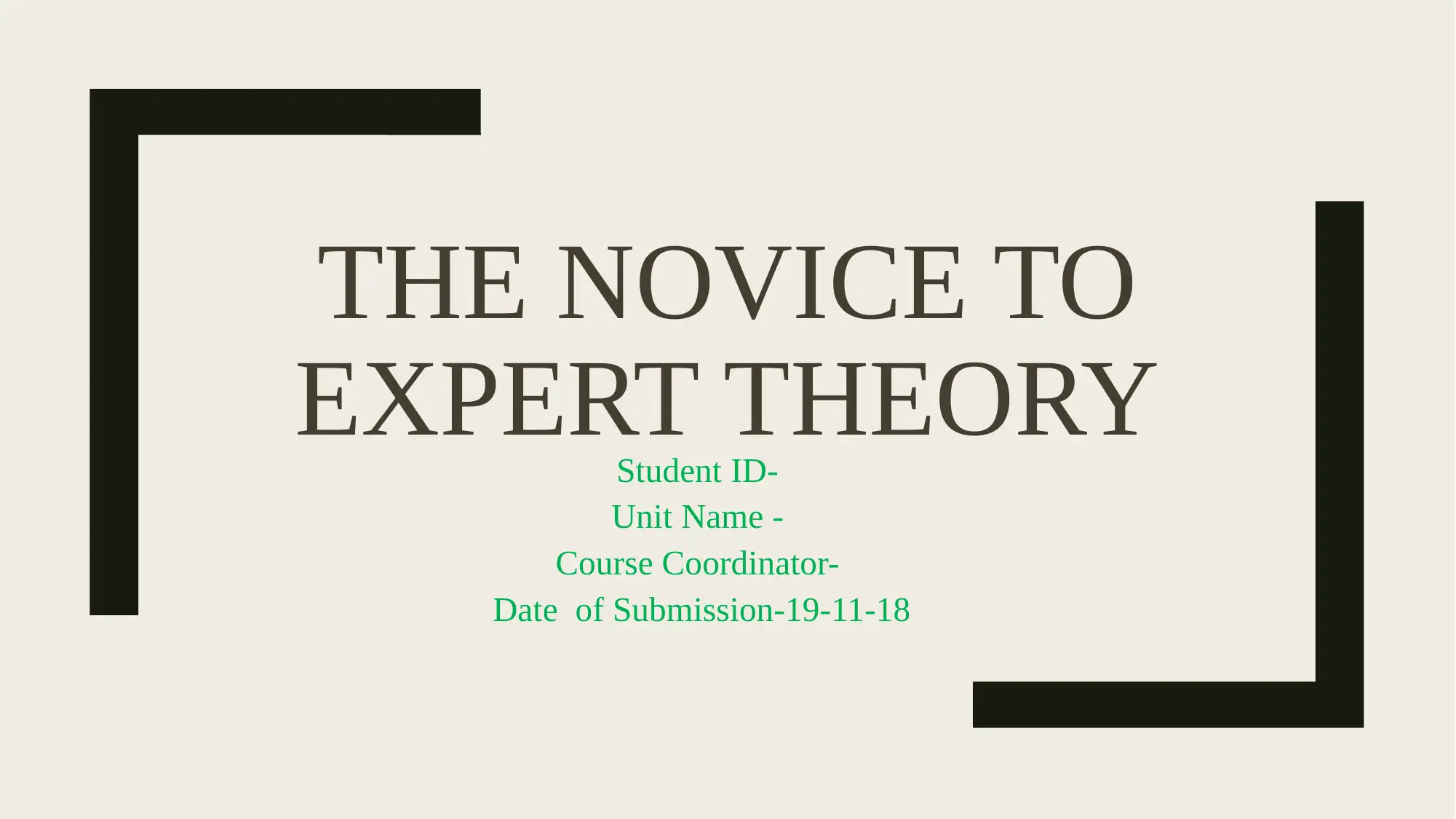
THE NOVICE TO
EXPERT THEORYStudent ID-
Unit Name -
Course Coordinator-
Date of Submission-19-11-18
EXPERT THEORYStudent ID-
Unit Name -
Course Coordinator-
Date of Submission-19-11-18
Paraphrase This Document
Need a fresh take? Get an instant paraphrase of this document with our AI Paraphraser
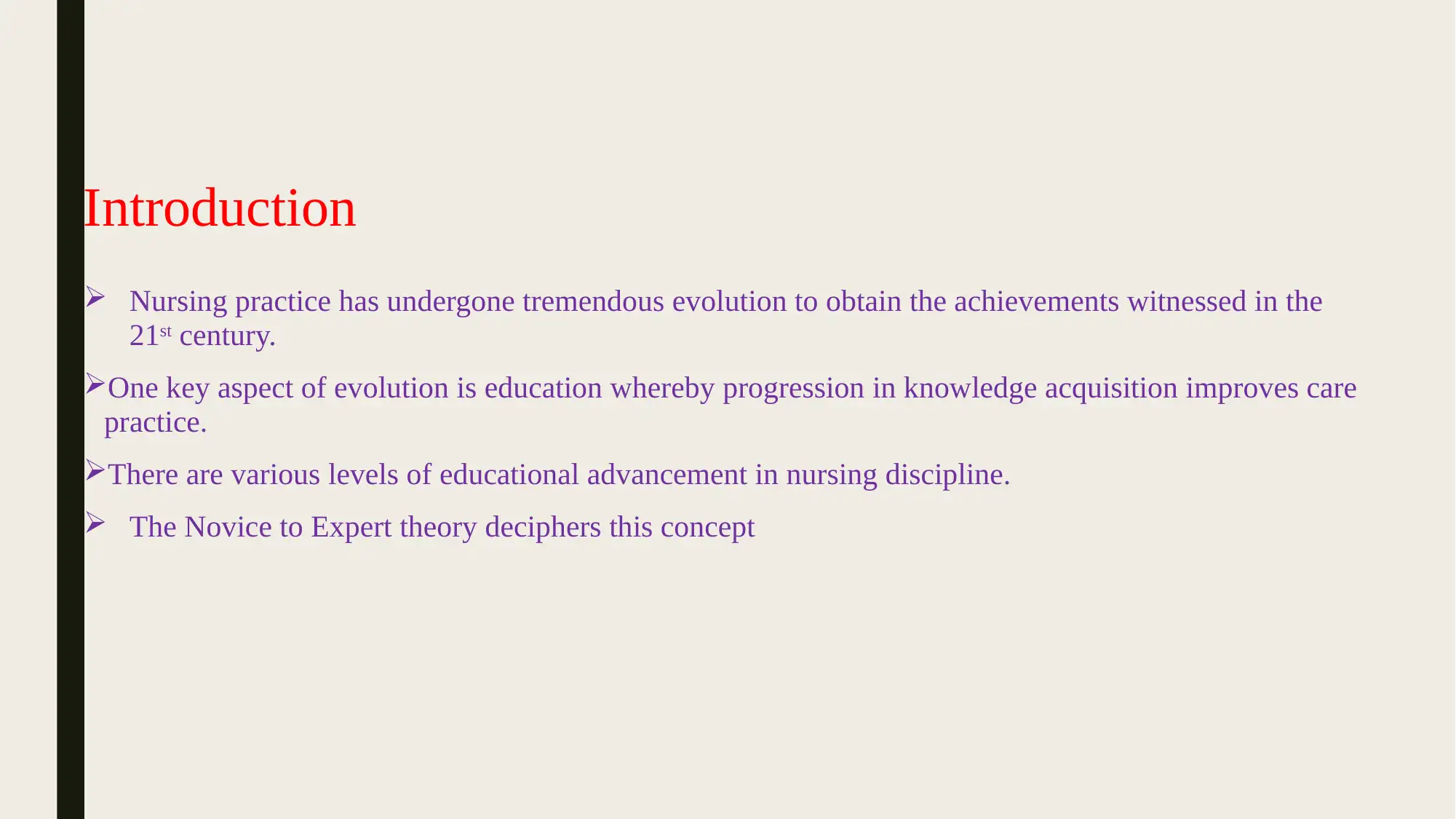
Introduction
Nursing practice has undergone tremendous evolution to obtain the achievements witnessed in the
21st century.
One key aspect of evolution is education whereby progression in knowledge acquisition improves care
practice.
There are various levels of educational advancement in nursing discipline.
The Novice to Expert theory deciphers this concept
Nursing practice has undergone tremendous evolution to obtain the achievements witnessed in the
21st century.
One key aspect of evolution is education whereby progression in knowledge acquisition improves care
practice.
There are various levels of educational advancement in nursing discipline.
The Novice to Expert theory deciphers this concept
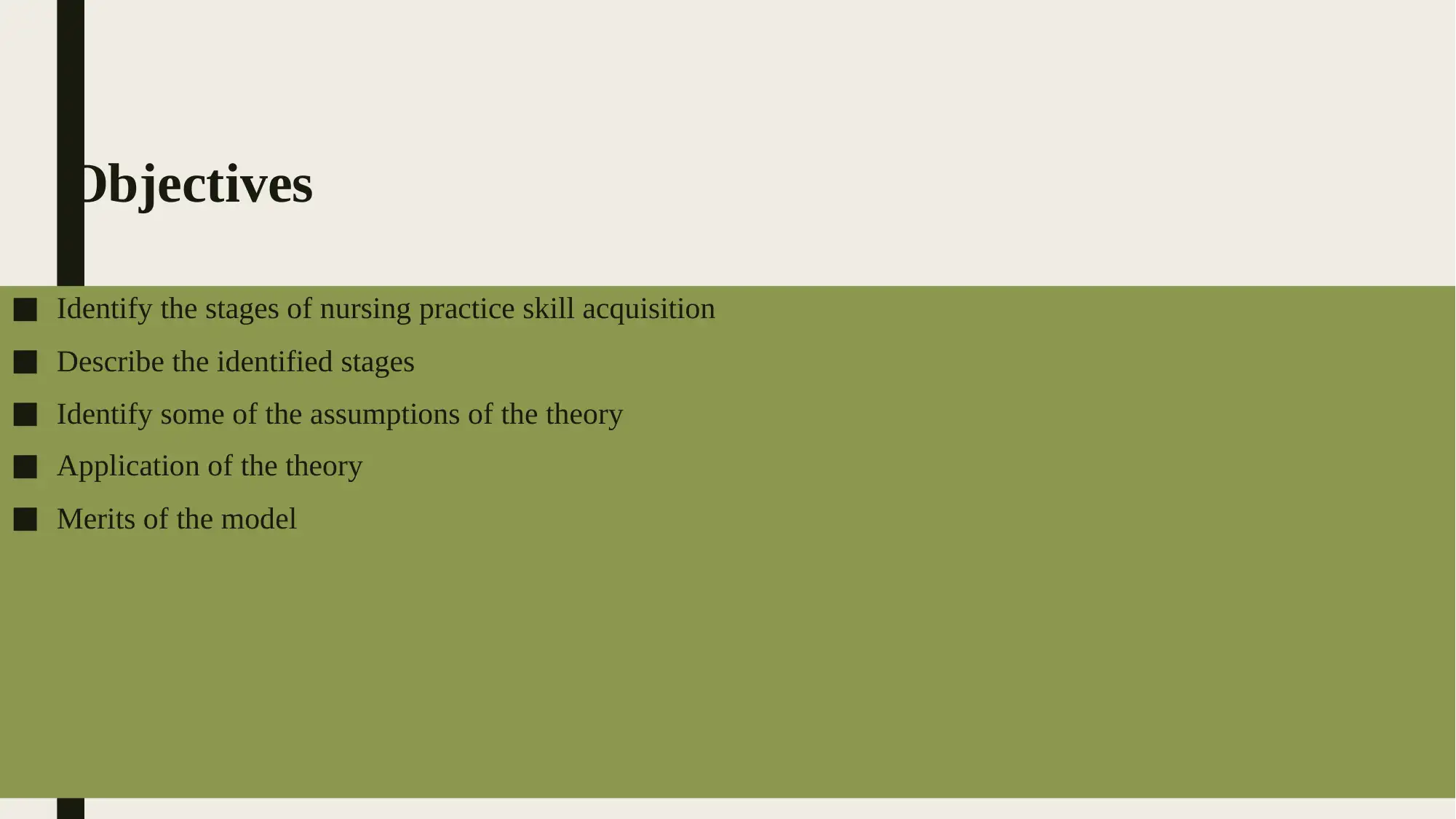
Objectives
■ Identify the stages of nursing practice skill acquisition
■ Describe the identified stages
■ Identify some of the assumptions of the theory
■ Application of the theory
■ Merits of the model
■ Identify the stages of nursing practice skill acquisition
■ Describe the identified stages
■ Identify some of the assumptions of the theory
■ Application of the theory
■ Merits of the model
⊘ This is a preview!⊘
Do you want full access?
Subscribe today to unlock all pages.

Trusted by 1+ million students worldwide
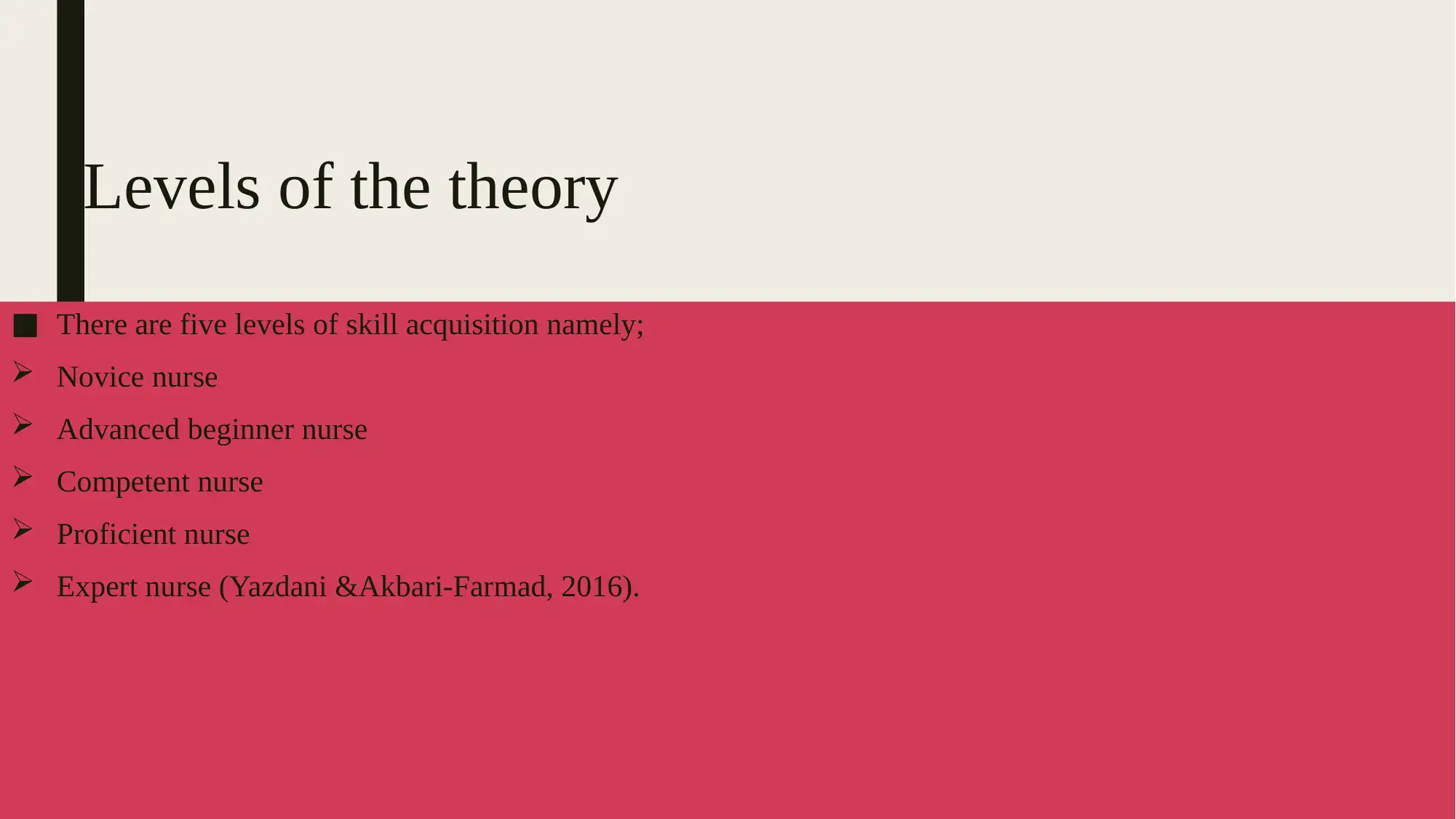
Levels of the theory
■ There are five levels of skill acquisition namely;
Novice nurse
Advanced beginner nurse
Competent nurse
Proficient nurse
Expert nurse (Yazdani &Akbari-Farmad, 2016).
■ There are five levels of skill acquisition namely;
Novice nurse
Advanced beginner nurse
Competent nurse
Proficient nurse
Expert nurse (Yazdani &Akbari-Farmad, 2016).
Paraphrase This Document
Need a fresh take? Get an instant paraphrase of this document with our AI Paraphraser
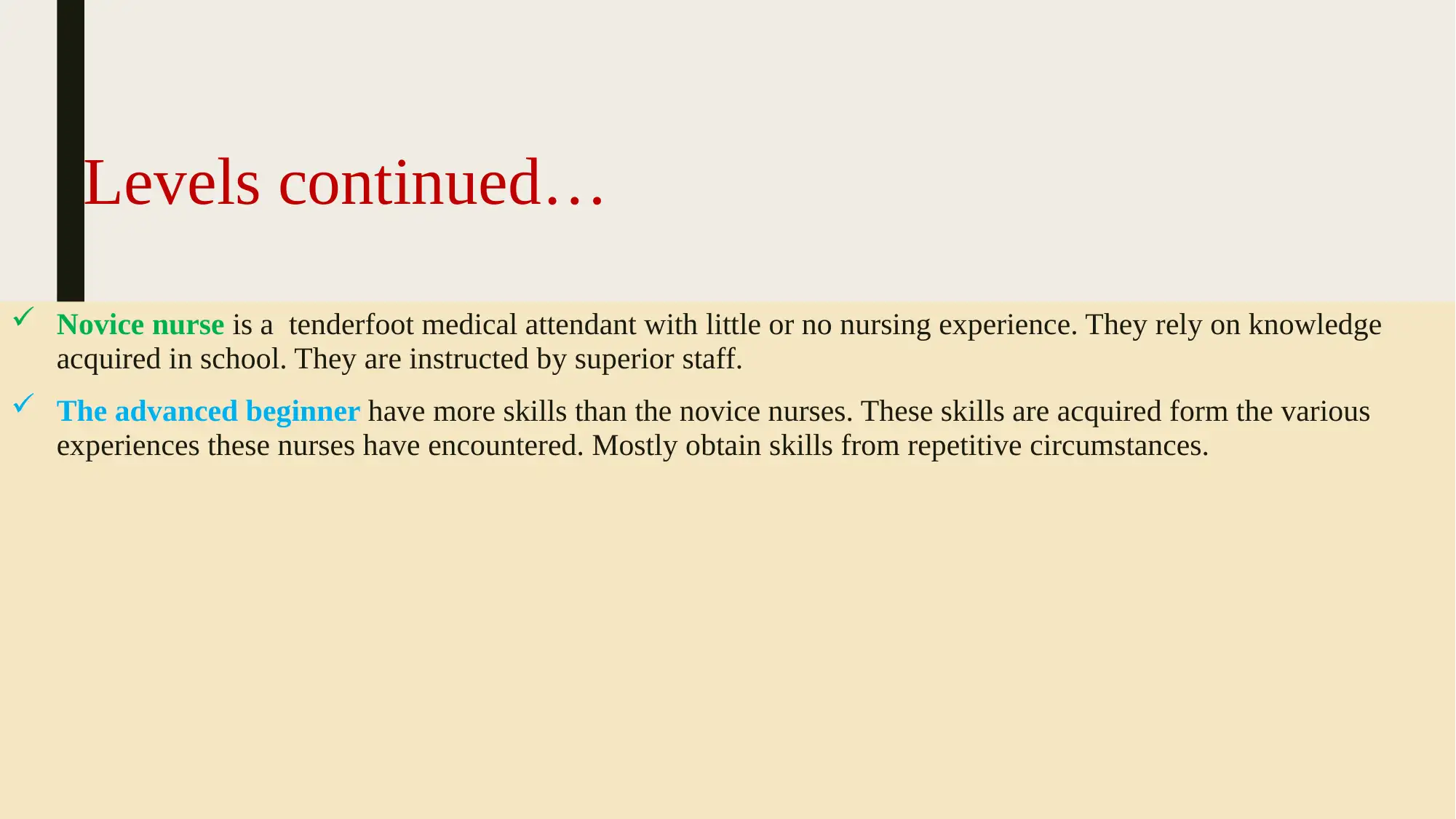
Levels continued…
Novice nurse is a tenderfoot medical attendant with little or no nursing experience. They rely on knowledge
acquired in school. They are instructed by superior staff.
The advanced beginner have more skills than the novice nurses. These skills are acquired form the various
experiences these nurses have encountered. Mostly obtain skills from repetitive circumstances.
Novice nurse is a tenderfoot medical attendant with little or no nursing experience. They rely on knowledge
acquired in school. They are instructed by superior staff.
The advanced beginner have more skills than the novice nurses. These skills are acquired form the various
experiences these nurses have encountered. Mostly obtain skills from repetitive circumstances.
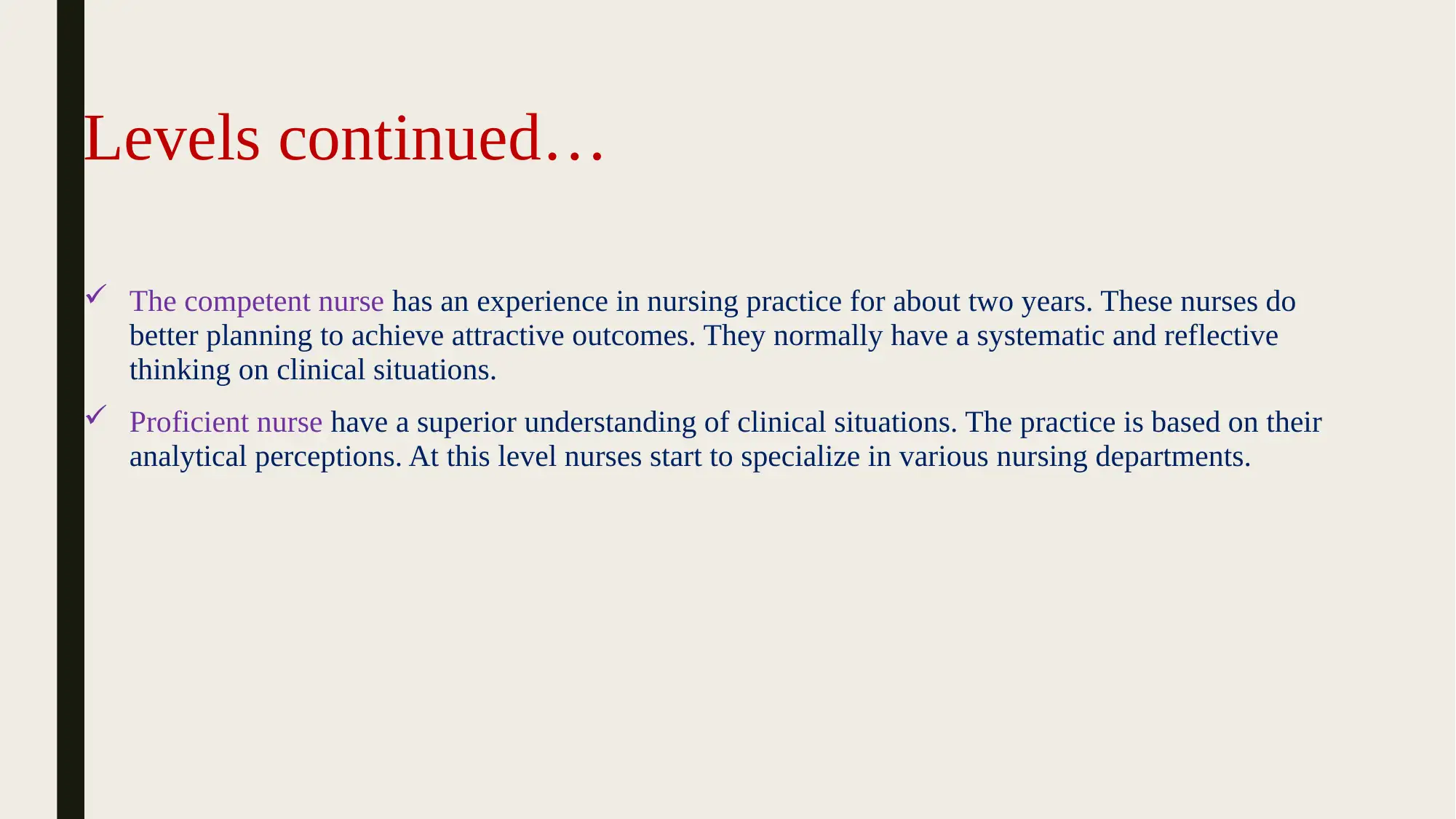
Levels continued…
The competent nurse has an experience in nursing practice for about two years. These nurses do
better planning to achieve attractive outcomes. They normally have a systematic and reflective
thinking on clinical situations.
Proficient nurse have a superior understanding of clinical situations. The practice is based on their
analytical perceptions. At this level nurses start to specialize in various nursing departments.
The competent nurse has an experience in nursing practice for about two years. These nurses do
better planning to achieve attractive outcomes. They normally have a systematic and reflective
thinking on clinical situations.
Proficient nurse have a superior understanding of clinical situations. The practice is based on their
analytical perceptions. At this level nurses start to specialize in various nursing departments.
⊘ This is a preview!⊘
Do you want full access?
Subscribe today to unlock all pages.

Trusted by 1+ million students worldwide
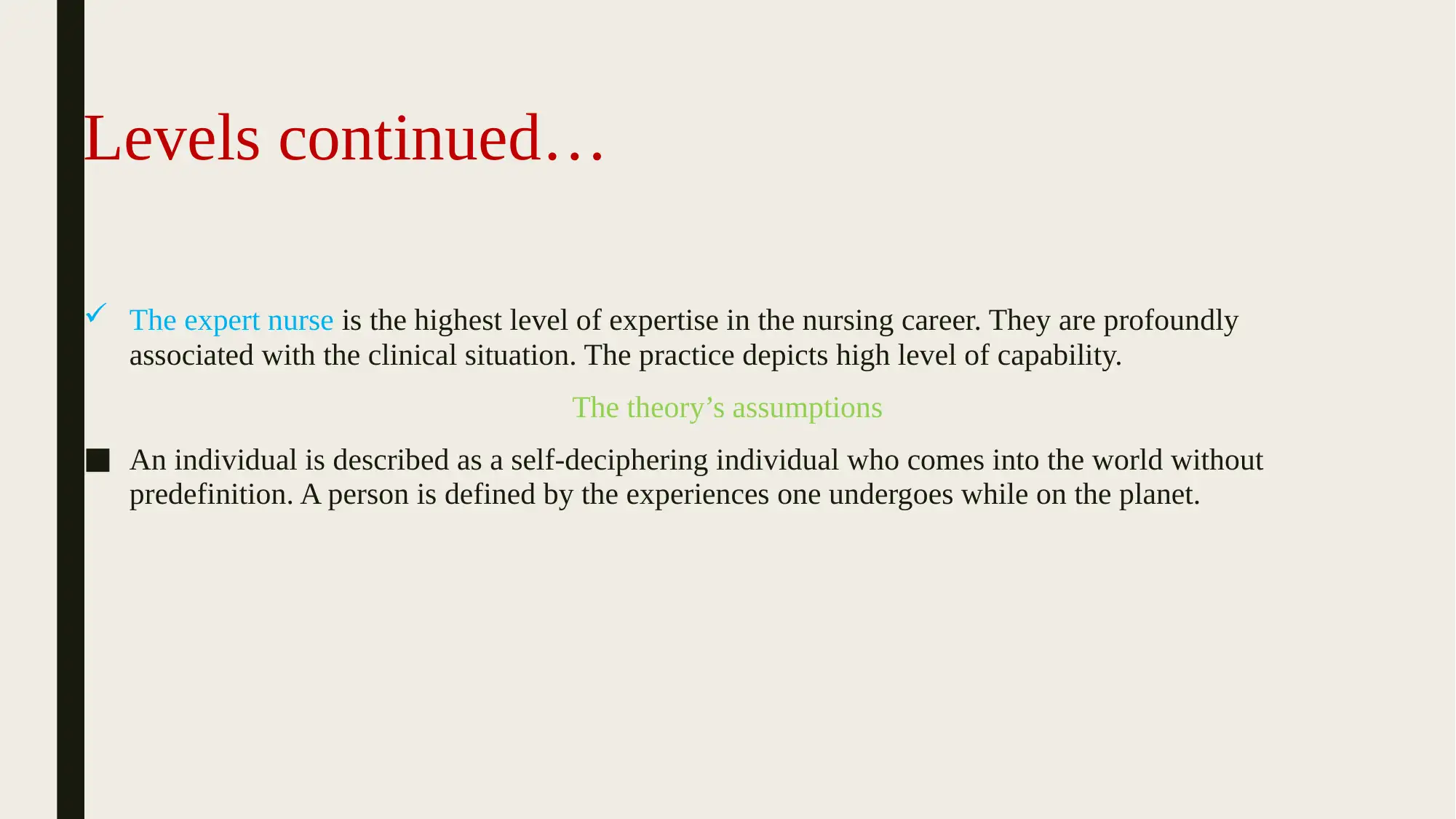
Levels continued…
The expert nurse is the highest level of expertise in the nursing career. They are profoundly
associated with the clinical situation. The practice depicts high level of capability.
The theory’s assumptions
■ An individual is described as a self-deciphering individual who comes into the world without
predefinition. A person is defined by the experiences one undergoes while on the planet.
The expert nurse is the highest level of expertise in the nursing career. They are profoundly
associated with the clinical situation. The practice depicts high level of capability.
The theory’s assumptions
■ An individual is described as a self-deciphering individual who comes into the world without
predefinition. A person is defined by the experiences one undergoes while on the planet.
Paraphrase This Document
Need a fresh take? Get an instant paraphrase of this document with our AI Paraphraser
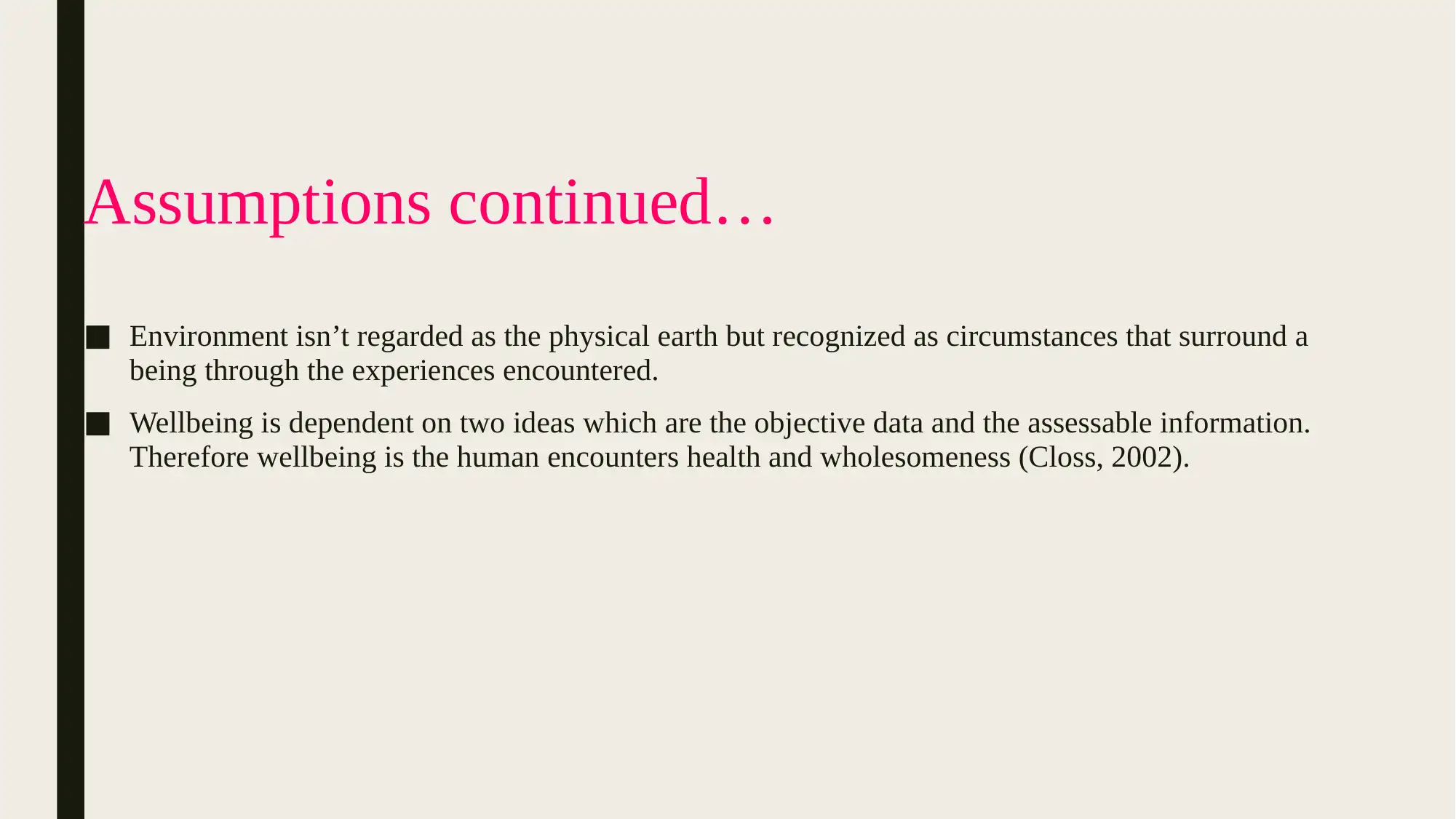
Assumptions continued…
■ Environment isn’t regarded as the physical earth but recognized as circumstances that surround a
being through the experiences encountered.
■ Wellbeing is dependent on two ideas which are the objective data and the assessable information.
Therefore wellbeing is the human encounters health and wholesomeness (Closs, 2002).
■ Environment isn’t regarded as the physical earth but recognized as circumstances that surround a
being through the experiences encountered.
■ Wellbeing is dependent on two ideas which are the objective data and the assessable information.
Therefore wellbeing is the human encounters health and wholesomeness (Closs, 2002).
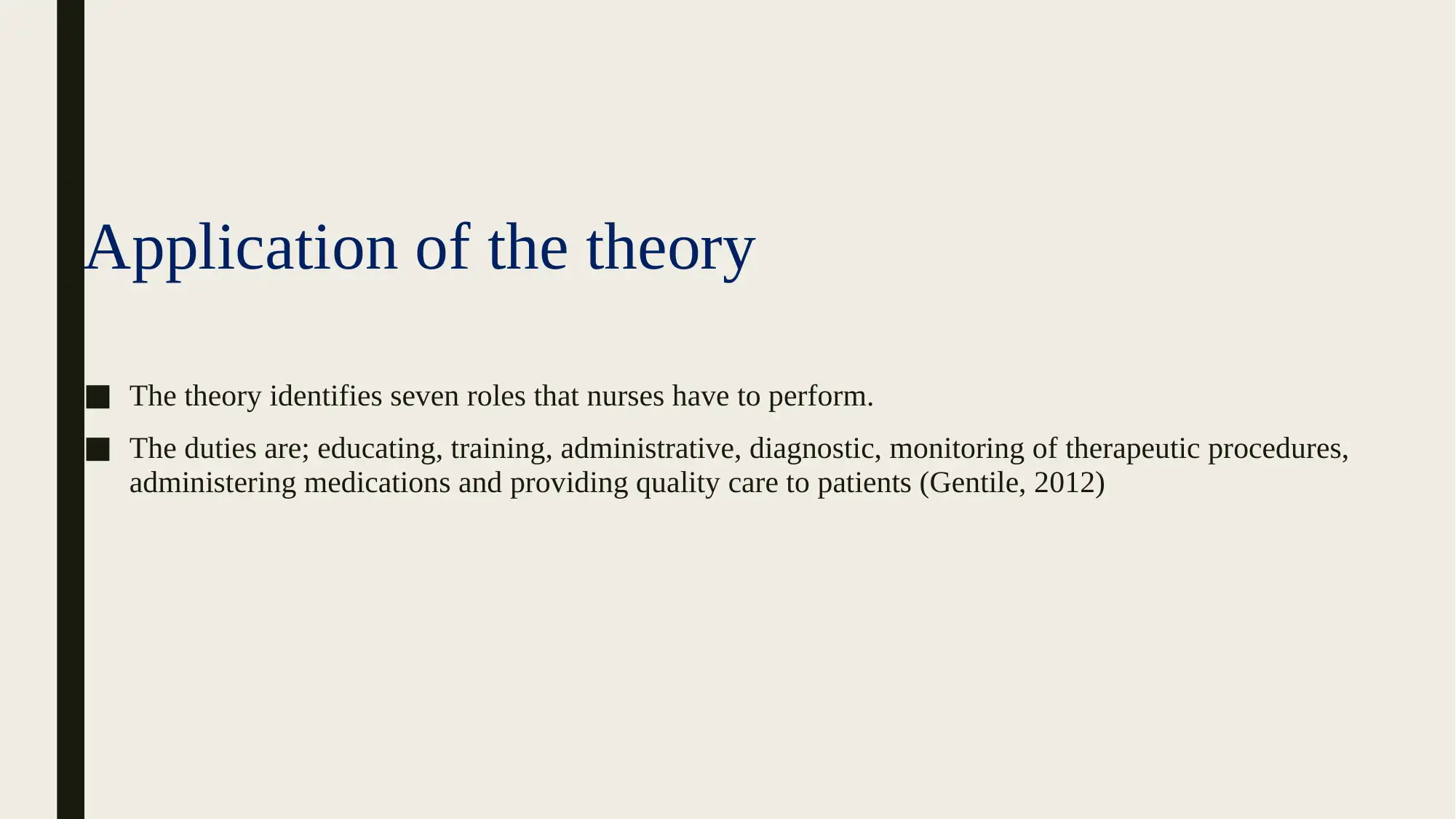
Application of the theory
■ The theory identifies seven roles that nurses have to perform.
■ The duties are; educating, training, administrative, diagnostic, monitoring of therapeutic procedures,
administering medications and providing quality care to patients (Gentile, 2012)
■ The theory identifies seven roles that nurses have to perform.
■ The duties are; educating, training, administrative, diagnostic, monitoring of therapeutic procedures,
administering medications and providing quality care to patients (Gentile, 2012)
⊘ This is a preview!⊘
Do you want full access?
Subscribe today to unlock all pages.

Trusted by 1+ million students worldwide
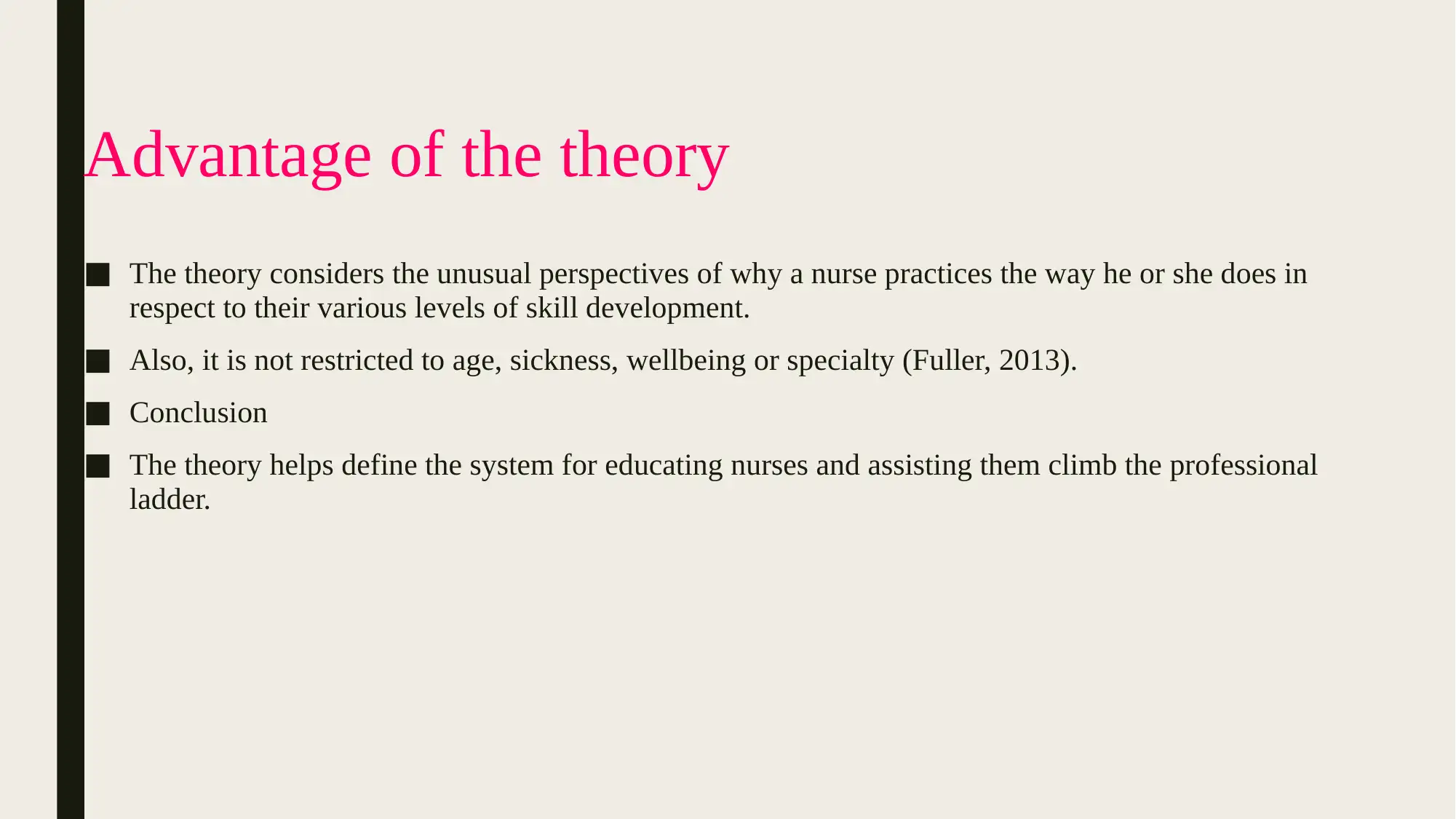
Advantage of the theory
■ The theory considers the unusual perspectives of why a nurse practices the way he or she does in
respect to their various levels of skill development.
■ Also, it is not restricted to age, sickness, wellbeing or specialty (Fuller, 2013).
■ Conclusion
■ The theory helps define the system for educating nurses and assisting them climb the professional
ladder.
■ The theory considers the unusual perspectives of why a nurse practices the way he or she does in
respect to their various levels of skill development.
■ Also, it is not restricted to age, sickness, wellbeing or specialty (Fuller, 2013).
■ Conclusion
■ The theory helps define the system for educating nurses and assisting them climb the professional
ladder.
Paraphrase This Document
Need a fresh take? Get an instant paraphrase of this document with our AI Paraphraser
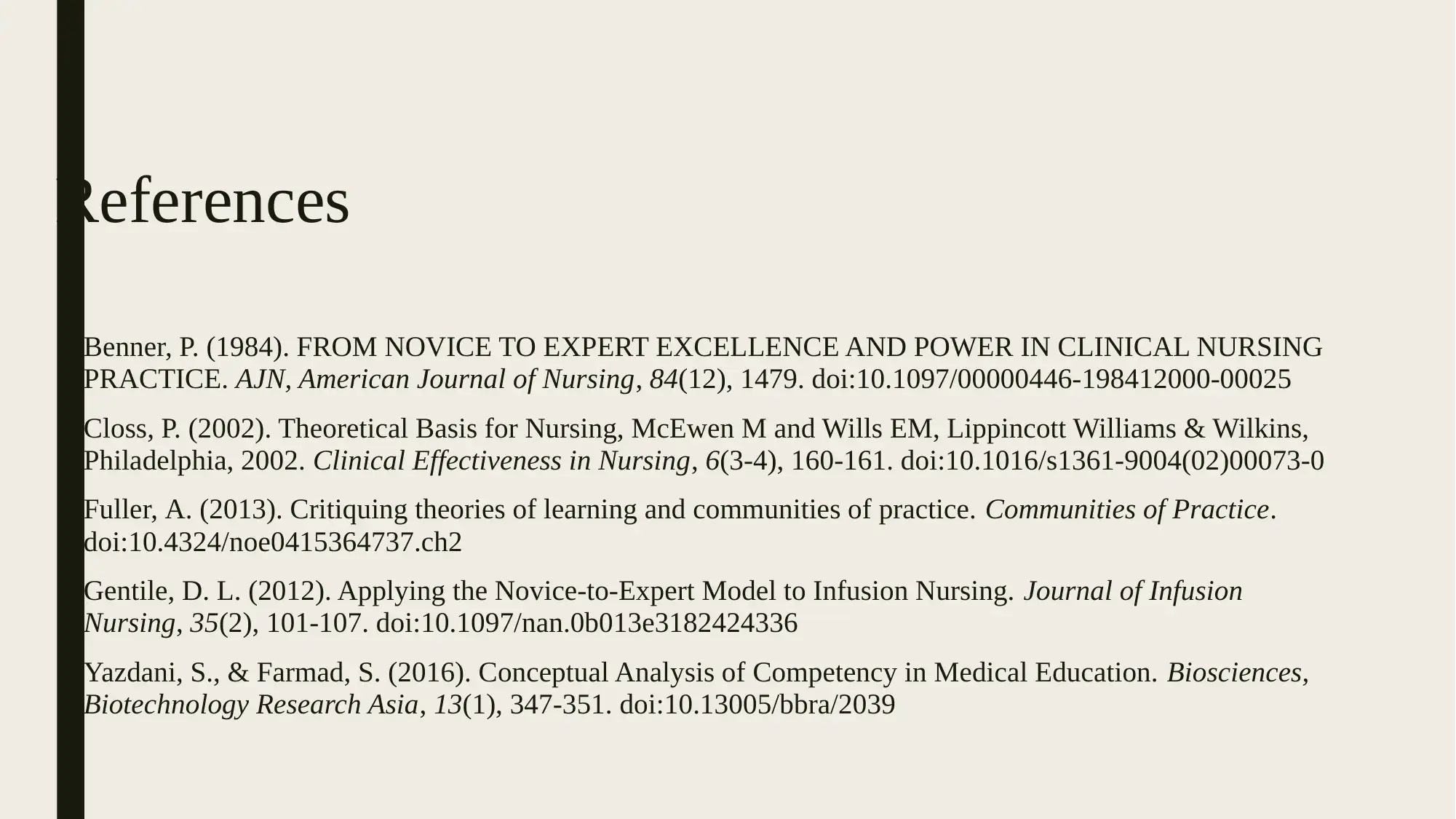
References
Benner, P. (1984). FROM NOVICE TO EXPERT EXCELLENCE AND POWER IN CLINICAL NURSING
PRACTICE. AJN, American Journal of Nursing, 84(12), 1479. doi:10.1097/00000446-198412000-00025
Closs, P. (2002). Theoretical Basis for Nursing, McEwen M and Wills EM, Lippincott Williams & Wilkins,
Philadelphia, 2002. Clinical Effectiveness in Nursing, 6(3-4), 160-161. doi:10.1016/s1361-9004(02)00073-0
Fuller, A. (2013). Critiquing theories of learning and communities of practice. Communities of Practice.
doi:10.4324/noe0415364737.ch2
Gentile, D. L. (2012). Applying the Novice-to-Expert Model to Infusion Nursing. Journal of Infusion
Nursing, 35(2), 101-107. doi:10.1097/nan.0b013e3182424336
Yazdani, S., & Farmad, S. (2016). Conceptual Analysis of Competency in Medical Education. Biosciences,
Biotechnology Research Asia, 13(1), 347-351. doi:10.13005/bbra/2039
Benner, P. (1984). FROM NOVICE TO EXPERT EXCELLENCE AND POWER IN CLINICAL NURSING
PRACTICE. AJN, American Journal of Nursing, 84(12), 1479. doi:10.1097/00000446-198412000-00025
Closs, P. (2002). Theoretical Basis for Nursing, McEwen M and Wills EM, Lippincott Williams & Wilkins,
Philadelphia, 2002. Clinical Effectiveness in Nursing, 6(3-4), 160-161. doi:10.1016/s1361-9004(02)00073-0
Fuller, A. (2013). Critiquing theories of learning and communities of practice. Communities of Practice.
doi:10.4324/noe0415364737.ch2
Gentile, D. L. (2012). Applying the Novice-to-Expert Model to Infusion Nursing. Journal of Infusion
Nursing, 35(2), 101-107. doi:10.1097/nan.0b013e3182424336
Yazdani, S., & Farmad, S. (2016). Conceptual Analysis of Competency in Medical Education. Biosciences,
Biotechnology Research Asia, 13(1), 347-351. doi:10.13005/bbra/2039
1 out of 11
Related Documents
Your All-in-One AI-Powered Toolkit for Academic Success.
+13062052269
info@desklib.com
Available 24*7 on WhatsApp / Email
![[object Object]](/_next/static/media/star-bottom.7253800d.svg)
Unlock your academic potential
Copyright © 2020–2026 A2Z Services. All Rights Reserved. Developed and managed by ZUCOL.





